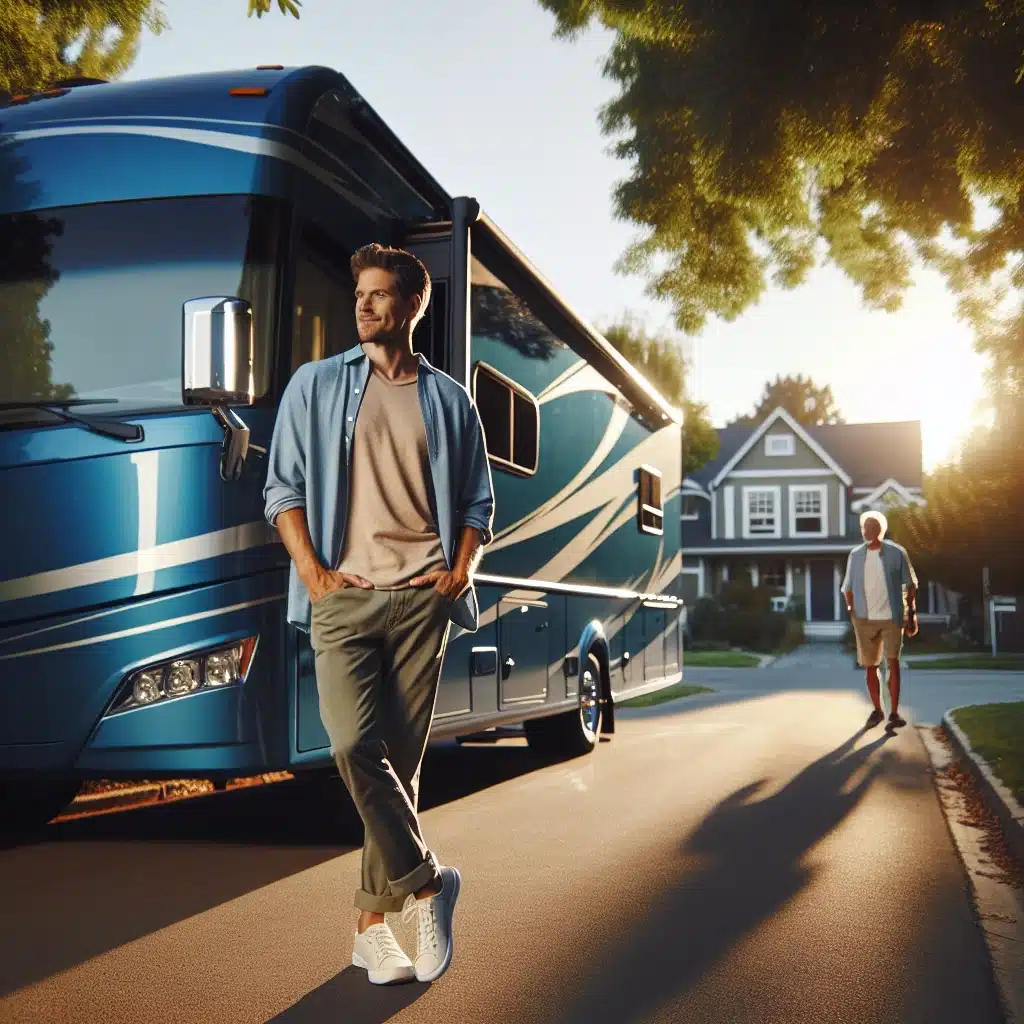Table of Contents

Power Your RV Adventures with the Sun: Device Charging Solutions
Imagine never having to search for a power outlet again. With solar power, your RV becomes a self-sufficient hub of energy, allowing you to charge devices, light up your space, and power appliances wherever the road takes you. It’s a game-changer for travel freedom and energy independence.
Key Points: Article-at-a-Glance
- Solar power transforms RV travel into a self-sufficient experience.
- Understanding the basics of RV solar systems is essential for choosing the right setup.
- Advancements in technology make solar an increasingly popular choice for RVers.
- Choosing the right type of solar panel can optimize your energy harvest.
- Installation and maintenance of solar systems are easier than you might think.
The Rise of Solar in RV Travel
Solar power isn’t just for homes or commercial buildings; it’s revolutionizing the way we think about RV travel. As we become more conscious of our environmental footprint and the need for sustainable living, solar panels on RVs have shifted from a luxury to a necessity for many adventurers.
Off-Grid Living Meets Renewable Energy
There’s something magical about going off-grid, isn’t there? It’s the ultimate expression of freedom. But to truly embrace this lifestyle, you need a reliable energy source. Solar power is that source, providing the energy you need without the noise and hassle of a generator.
The Impact of Solar Power on RVing
- Freedom to explore without reliance on hookups.
- Quiet, clean energy replaces noisy, polluting generators.
- Reduced long-term costs with free power from the sun.
- Increased resale value of RVs equipped with solar systems.
- Peace of mind knowing you have a sustainable power source.

Understanding RV Solar Charging Basics
To harness the sun’s power effectively, you need to understand the basics. An RV solar charging system consists of solar panels, a charge controller, batteries for storage, and an inverter to convert stored DC power into AC power for your devices.
Different Types of RV Solar Panels
- Monocrystalline panels: Efficient and space-saving, ideal for smaller roofs.
- Polycrystalline panels: Cost-effective with a larger footprint, suitable for larger roofs.
- Thin-film panels: Flexible and lightweight, but less efficient and require more space.
- Portable panels: Great for temporary setups or additional energy needs.
Choosing the right type of panel depends on your energy needs, roof space, and budget. Each type has its pros and cons, but all can provide the power you need for a comfortable RV experience.
How Solar Power Systems Work for RVs
Let’s break it down: solar panels collect sunlight and convert it into electricity. That electricity flows to a charge controller, which regulates the charge to the batteries, preventing overcharging. The stored energy in the batteries is then available for use at any time. When you need to power AC devices, an inverter converts the DC electricity from the batteries into AC electricity.
Assessing Your Energy Needs
Before diving into solar, you need to know how much power you use. Start by listing all the devices and appliances you’ll want to power. Check their wattage and estimate how many hours per day you’ll use them. This will give you a daily watt-hour total, which is crucial for designing your solar system.
Selecting the Right Solar Solution for Your RV
With your energy needs in hand, it’s time to find a solar solution that fits. You’ll want to consider the size of your RV roof, your travel habits, and whether you’ll be mostly in sunny or overcast environments. These factors will determine the size and type of solar setup you’ll need.
Finding the Perfect Solar Panel Setup
Here’s the deal: not all solar setups are created equal. You’ll want to find a balance between the number of panels and the available space on your RV’s roof. More panels mean more power but also require more space and a larger initial investment. Quality is key, so look for panels with high efficiency and robust warranties.
Choosing Between Portable and Fixed Systems
Portable systems give you flexibility. You can move them to catch the sun and store them when not in use. Fixed systems, on the other hand, are always ready to go, but they require a more complex installation. Your choice will depend on your lifestyle and how much effort you want to put into setup and takedown.
Navigating Battery and Storage Options
- Lead-acid batteries: Tried and true, cost-effective, but require maintenance.
- Lithium batteries: More expensive upfront, but longer lifespan and virtually maintenance-free.
- Battery capacity: Measured in amp-hours (Ah), this should meet or exceed your daily energy use.
- Expandability: Consider whether you might want to add more batteries in the future.
Think of your batteries as the fuel tank for your solar system. Larger capacity means more energy storage, but also a heavier and more expensive system. Balance is essential.

Installation Tips for Solar-Powered Charging Systems
Installing a solar system can be a rewarding DIY project. You’ll need the right tools, a good understanding of electrical systems, and patience. Start by mapping out where each component will go, ensuring the panels get maximum sunlight and the batteries are safely housed. It’s crucial to follow the manufacturer’s instructions and local electrical codes.
If DIY isn’t your thing, professional installation is a great option. It ensures your system is set up correctly and safely. Plus, many installers offer warranties on their work.
Tools and Equipment You’ll Need
Gearing up for installation means gathering the right tools. You’ll need a drill, screws, sealant, wire strippers, crimpers, and a multimeter for testing connections. Also, have a good set of wrenches and screwdrivers on hand. For mounting panels, you’ll need brackets or a mounting kit that’s compatible with your RV’s roof.
Do-It-Yourself Installation vs. Professional Help
DIY installation can save you money and give you a deep understanding of your system. It’s a great choice if you’re handy and have a basic knowledge of electrical systems. But, if you’re not confident, professional help is the way to go. Pros can ensure your system is safe and optimized for your RV.
Safety Measures and Best Practices
- Always disconnect the battery before working on your solar system.
- Use proper safety gear, like gloves and eye protection, when installing panels.
- Securely mount all components to avoid damage while on the move.
- Follow the National Electrical Code (NEC) for all wiring and installations.
- Check the weather forecast before starting your installation to avoid rain or high winds.
Maintaining Your RV Solar Charging System
Regular maintenance is key to keeping your solar system at peak performance. It’s not just about longevity; it’s about ensuring you’re always ready for adventure. A well-maintained system can provide reliable power for years to come.
Routine Checks and Cleanings
Keep your solar panels clean and free of debris to ensure maximum efficiency. Periodically inspect your system’s wiring and connections for signs of wear or damage. Tighten any loose connections and replace worn parts as needed.
Monitoring System Health: Charge Controllers and Inverters
Your charge controller and inverter are the brains of your solar system. Regularly check the readouts to ensure they’re operating within their normal ranges. If you notice any irregularities, troubleshoot them promptly or consult with a professional.
Upgrading and Expanding Your Solar Setup
As your energy needs grow, so might your solar system. Upgrading to higher efficiency panels or expanding your battery bank can provide more power. Always ensure that new additions are compatible with your existing setup and consult with a professional if you’re unsure.
Calculating Cost Benefits and ROI
When it comes to solar power for your RV, the numbers tell a compelling story. Sure, there’s an upfront cost, but the long-term savings and return on investment (ROI) can be significant. Let’s crunch the numbers and see why going solar is a smart financial move.
Upfront Investment vs. Long-Term Savings
Initially, outfitting your RV with a solar system might seem like a big expense. But think about it this way: every ray of sunshine that hits your panels is free energy you’re not buying from the grid or pouring into a generator as fuel. Over time, those savings add up, turning your upfront investment into a stream of financial benefits.
How Solar Charging Extends Battery Life
Batteries have a tough life, especially when they’re drained and recharged repeatedly. Solar charging is a game-changer because it can keep your batteries topped off and avoid deep discharges, which is when the real damage happens. This gentle, steady charge not only keeps you powered up but also prolongs the life of your batteries, saving you money on replacements.
When to Expect Break-Even on Solar Investments
So, when will solar start paying for itself? It’s a common question with a variable answer. The break-even point depends on how much you use your RV, the cost of your solar setup, and the price of alternative power sources. For some, it could be a few years; for others, a bit longer. But remember, with solar, you’re not just saving money—you’re investing in energy independence.
Embracing Eco-Friendly RVing with Solar Power
Eco-friendly living and RVing are a perfect match. Solar power lets you enjoy the great outdoors while minimizing your environmental impact. It’s a way to travel responsibly, knowing that you’re part of the solution, not the problem.
Contributing to Sustainability on the Road
Every watt of solar power you use is a watt that’s not coming from fossil fuels. By choosing solar, you’re reducing your carbon footprint and helping to combat climate change. It’s a proactive step towards a cleaner, greener planet, and it starts right on your RV’s roof.
The Environmental Advantages of Ditching Generators
Generators are noisy, smelly, and a source of emissions. When you switch to solar, you ditch the generator and all the downsides that come with it. The silence of solar is profound, and the air is cleaner for everyone—plants, animals, and fellow campers alike. It’s a win-win for you and the environment.
Frequently Asked Questions
Can Solar Panels Power My Entire RV?
Absolutely! Solar panels can be designed to meet all of your RV’s energy needs. The key is to calculate your total power usage and install enough solar panels and batteries to match your consumption. Many RVers run their lights, electronics, and even air conditioning solely on solar power.
What Happens When Solar Charging Isn’t Enough?
On cloudy days or if your energy use exceeds your system’s capacity, you might need a backup. This could be a generator, a connection to shore power, or a visit to a campground with electrical hookups. It’s always wise to have a plan B for those just-in-case scenarios.
Are Solar Systems Feasible for Short Weekend Trips?
Yes, solar systems are great for any length of trip. Even for short getaways, they provide a convenient and eco-friendly way to keep your batteries charged and your devices powered. Plus, they reduce your reliance on campground hookups, giving you more freedom to camp off the beaten path.
How Do Weather Conditions Affect Solar Charging?
Solar panels need sunlight to produce power, so overcast weather can reduce their output. However, modern panels are quite efficient and can still generate electricity on cloudy days, just at a lower rate. It’s important to factor in your local weather patterns when sizing your system.
In conclusion, solar power offers RV enthusiasts the freedom to explore without boundaries, the comfort of modern amenities, and the peace of mind that comes with sustainable living. By understanding the basics, choosing the right components, and maintaining your system, you can enjoy the many benefits of solar-powered RVing. It’s a smart investment that pays dividends in energy independence, cost savings, and environmental stewardship. So why not harness the power of the sun and take your RV adventures to new, greener horizons? Happy travels!
- Boondocking RVs: Flexible Solar Solutions – 3 March 2024
- Renewable Energy Tips for Full-Time Boondocking RVers – 2 March 2024
- Boondocking Solar Power Systems: Sizing Options & Solutions for Motorhomes – 1 March 2024
